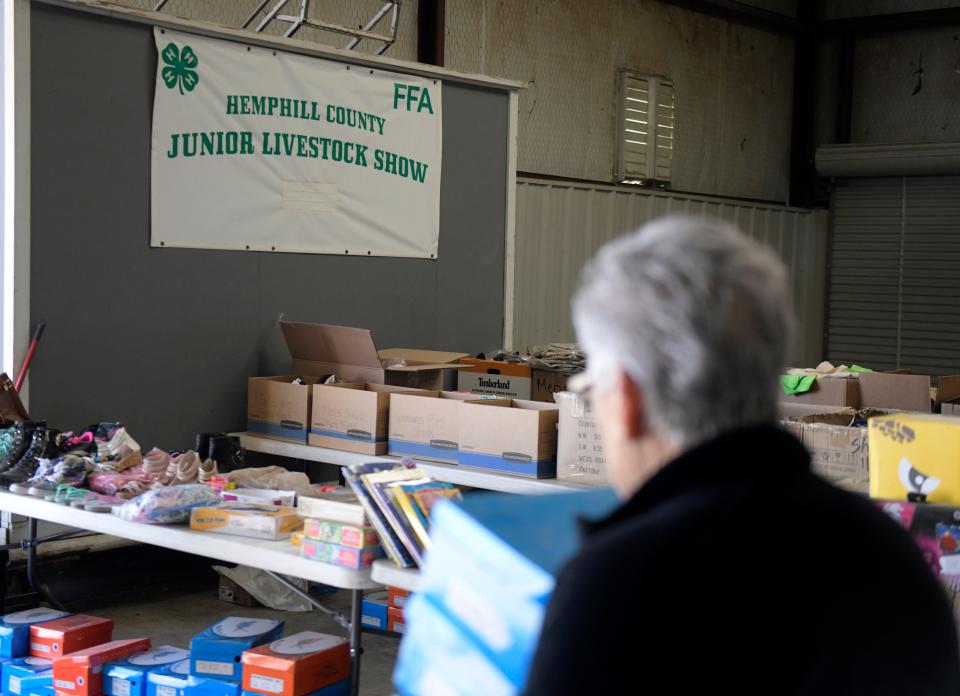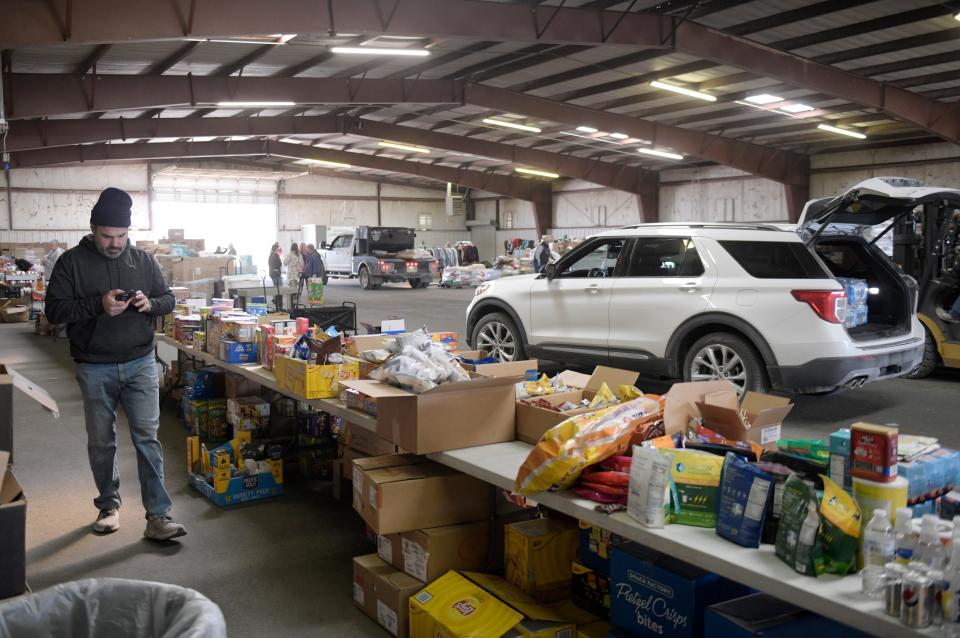As thousands of cattle die in Panhandle, ranchers across Texas unite to help
- Oops!Something went wrong.Please try again later.
In a video that went viral on Facebook, a convoy of trailers and trucks stretched the length of a football field as they traveled along the backroads between Childress and Canadian en route to aid cattle producers affected by the ongoing wildfires.
Like ants on a log, following one after another to the Panhandle, each was filled to the brim with hay and other supplies, responding to the urgent need for vital sustenance, as the wildfires consumed their primary source for food.
Since last Monday, five fires have ravaged the Panhandle, scorching more than 1.1 million acres in total, destroying hundreds of homes and taking the lives of at least two residents, in addition to thousands of head of cattle.

The Smokehouse Creek Fire is one of five wildfires that ignited in the Panhandle last week — and it made history as the largest wildfire on record. This fire, alone, has burned more than 1,078,000 acres, or equivalent to 1,700 square miles. As of Monday afternoon, the wildfire, which is now five times the size of New York City and larger than the entire state of Rhode Island, was still only 15% contained.
The cause of the fire has remained uncertain since it began Monday afternoon, but according to a filing with the U.S. Securities Exchange Commission, investigators from several insurance companies communicated with Xcel Energy this week via a law firm, questioning if one of its downed utility poles may have started the fire. Reuters further reported that an affected homeowner filed a lawsuit in Hemphill County against Xcel on Friday with the same allegations, but the Amarillo Globe-News and Lubbock Avalanche-Journal could not immediately retrieve the filing.
In a visit to the Panhandle on Friday afternoon, Gov. Greg Abbott stated that the cause of the fire remains under investigation and the Texas Department of Emergency Management will continue to assess the damage.
"When you look at the damages that have occurred here it's just gone, completely gone nothing left but ashes on the ground," Abbott said during a news conference in Borger.

West Texans helping West Texans
Located in a prominent land for cattle production — the world's largest region for beef production — the Smokehouse Creek Fire has impacted cattle producers and farmers far and wide. In a news conference late last week, Texas Department of Agriculture Commissioner Sid Miller alleged the rough estimate of dead cattle had totaled thousands, although many more would die or undergo euthanasia due to the trauma from the wildfires."
“It’s been very devastating,” Miller told CNN in an interview last week. “There’s no grass, there’s no water for all the livestock. We’ve lost over 3,000 head, which is a very small number – that will double or triple easily. We’ve got cattle that we’re going to have euthanized because of the damage to their hooves, their udders - we’ll just have to put them down.”
In a tragedy unfolding for hundreds of ranches on the Panhandle, cattle producers and experts are describing an unprecedented scene that has never been witnessed before as wildfires continue. The historic Turkey Track Ranch in Stinnett, a pioneering ranch once acclaimed as "Prize of the Panhandle" by LAND Magazine, has been completely destroyed, for instance.
Already, the region has reached slower production in recent years, contributing to the state's lowest inventory since 1968 due to drought and extreme temperatures. The aftermath of this week's wildfires are poised to increase that loss exponentially.
In Roberts County, situated west of Canadian and north Pampa, County Judge and Emergency Management Coordinator Mitchell Locke described a dire situation for the local cattle industry.
More than 85% of the state's cattle production occurs in the Panhandle, and although the majority is based in feedlots and dairy farms — which received additional protection among the fires — many of the independent ranchers and cattle producers will now suffer.
"(Even though the active wildfires were not close to town), it's still a problem in places," Locke said. "This is cattle country, and we are trying, our fire departments are trying, to preserve grass. It might seem like just grass to some people, but that's people's livelihood, because that's the main source of income for their cattle ... We won't know (how many cattle are dead) for a month because the fences are gone, and they might be 10 miles away from where they originally were, or they might be dead."
In an interview the Amarillo Globe-News and Lubbock Avalanche-Journal, one supporter had only one word to describe what he'd be feeling if he was in the position of ranchers in the Panhandler: "Devastating."
That's why he, and his friend, Casey Smith of Midland, chose to bring hay to those ranchers struggling in Canadian and Fritch.
"That's really West Texas character," said Chad Merritt of Midland. "It's what we do."
Their story is one of hundreds of Texans to have pitched in, supporting other Texans in the aftermath and ongoing distress caused by the Panhandle wildfires.
In agreement with Merritt's description of a "neighbor-helping-neighbor situation," Smith said he was just trying to help where he could. While they had not seen any livestock along the way, that wasn't important to him. What was important to him, was helping others.
This article originally appeared on Lubbock Avalanche-Journal: As cattle dies in Panhandle, ranchers across Texas assist

